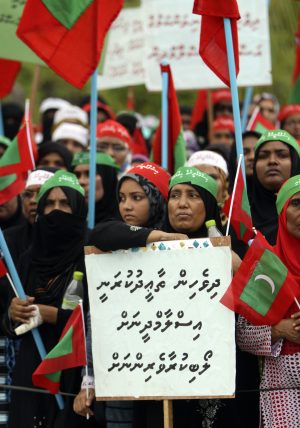Last week, the Maldives Independent reported some rather startling news. Security services revealed that there are close to 1,400 Maldivians who would kill in the name of Islam. Officials also confirmed that an Islamic State bomb plot was foiled in 2017 and that, since 2013, 423 Maldivians attempted to enter Iraq and Syria – 173 successfully – to fight for the so-called caliphate. This makes the Maldives possibly the highest per capita source of foreign fighters of any nation.
The Maldives provide an interesting case study of how the international proliferation of Saudi-sponsored Wahhabism has contributed to violent extremism and the radicalization of foreign fighters. Although there are many complex factors contributing to extremism in the Maldives, Saudi proselytization is nonetheless an important factor.
The increasing religious conservatism and intolerance displayed in Maldivian society contrasts sharply with the island nation’s Sufi-orientated Shafi’i Sunni Islam. Interspersed with influences from the country’s Buddhist past, this mellow form of Islam emphasized tolerance. Overt signs of piety were relatively rare, as was religious-inspired violence.
Some context is necessary to understand the Saudi drive to export Wahhabism. In a bid to placate the powerful Wahhabi religious establishment, in the aftermath of Iran’s Islamic Revolution, Riyadh allowed Wahhabism a more prominent place in public life. Part of this grand bargain was to allow the religious establishment to export their puritanical version of Islam to the world. Wahhabi madrassas – or religious schools – began popping up around the world, as the Saudi state poured an estimated $100 billion into spreading the creed. The other side of the equation, of course, is that the spread of Wahhabism was viewed by some in Riyadh as being synonymous with the spread of Saudi influence. This was seen as vital to safeguarding Saudi Arabia’s place at the center of the Islamic world in the face of the challenge posed by Iran and its alternative velâyat-e Faqih (rule of the cleric) model.
The rise of Wahhabi-inspired Islam in the Maldives can thus be traced back to the 1970s and 1980s, when many Maldivian students returned home from studying at Wahhabi madrasas in Pakistan and Saudi Arabia. Although not a Wahhabi himself, the Maldives’ then president, the Egyptian-educated Maumoon Abdul Gayoom, moved to emphasis the country’s Islamic identity. Under Gayoom’s 1997 constitution, only Muslims can be citizens and non-Muslims are prohibited from practicing their religion in public.
However, it was not until the 21st century that Wahhabism was able to make rapid inroads into the Maldives. An important factor in this was the country’s political liberalization and transition to democracy in the mid-2000s. Wahhabi imams and activists who had previously been kept in check under Abdul Gayoom had a greater chance to influence the country’s politics and civil society.
Another development facilitating what one Maldivian scholar described as the “biggest transformation of the religious landscape of the Maldives” since its conversion to Islam in the 12th century was the deepening of Saudi-Maldives ties under the presidency of Abdulla Yameen. The now ex-president had grand ambitions for the nation’s economic development. Much has been made of the influx of Chinese funds into the Maldives, but Saudi largesse has also been significant. Since 2013, the Binladin group has won big construction contracts, Riyadh has promised over $300 million in soft loans and at one point, there were plans afoot for the Saudis to purchase the entire Faafu Atoll.
Increasing religious influence quickly followed the influx of Saudi cash. In 2014, then-Crown Prince Salman bin Abdulaziz Al Saud pledged to build a slew of mosques, including the 10-story King Salman Mosque and Islamic Center in the capital, Malé. More importantly, the Saudis deepened their efforts to educate Maldivian religious scholars, disseminate religious texts, and send preachers across the scattered archipelago. At the same time, Yameen moved to promote religion in the public sphere and compete with the opposition to talk up his religious credentials. In 2014, Yameen introduced the death penalty for apostasy.
Just months before Yameen’s controversial decree, in October 2013, the first reports emerged of Maldivians quietly slipping away to Syria. Many of the almost 200 came from Malé, where in 2015 hundreds of protesters marched through the city waving Islamic State and Jabhat al-Nusra flags.
Social and economic conditions in the capital are another key element in violent extremism’s ascendancy. Around 100,000 residents cram into Malé’s one square mile. Unemployment, substance abuse, and gang violence are all high, while wages are low. As in other contexts, former gang members – often exposed to extremists in jail – see becoming a foreign fighter as a chance at a perverse kind of redemption. A disturbing synergy between jihadists and gang members has seen the latter involved in attacking gay rights activists and moderate politicians – and possibly murdering secular bloggers.
Establishing a definitive causal link between Wahhabism and violent radicalism is difficult. It is important to note that Wahhabism itself – although promoting extreme intolerance and sharing significant commonalities with violent jihadi ideologies – often does not actively advocate violence. However, it seems indisputable that combined with the aforementioned political, social, and economic factors, Saudi-sponsored Wahhabi ideas have helped create fertile ground for the spread of violent extremism.
Ultimately, the international community must hold Crown Prince Mohammed Bin Salman to his pledge to promote moderate Islam not only within the Kingdom but also abroad.
Henry Storey holds a Master of International Relations degree from Melbourne University. He is an editor at Foreign Brief and currently works as an analyst for political risk consultancy in Melbourne.

































